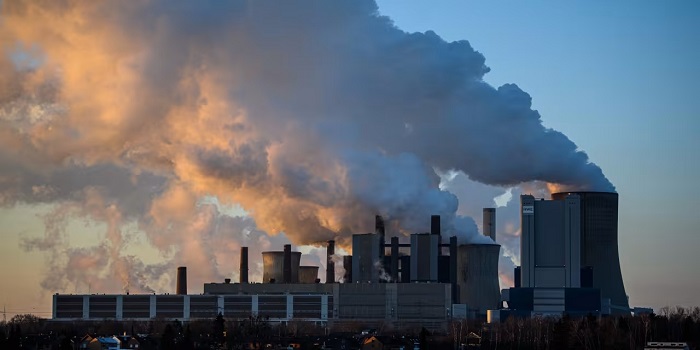Analysis published March 2025 by Carbon Majors reveals that half of the world’s carbon dioxide emissions in 2023 originated from just 36 fossil fuel companies, including industry giants like Saudi Aramco, ExxonMobil, and Shell. These companies collectively contributed over 20 billion tonnes of CO₂ emissions last year, exacerbating the global climate crisis.

Indeed, the new analysis of the latest emissions data for the Carbon Majors companies reveals that overall emissions from the world’s largest oil, gas, coal, and cement producers increased in 2023 compared to 2022, with over 50% of these emissions linked to just 36 high-emitting companies.
Despite overwhelming scientific evidence connecting greenhouse gas emissions and catastrophic global warming, 93 of the companies in the Carbon Majors database increased their emissions in 2023, including 50 investor-owned companies.
The top five state-owned emitters – Saudi Aramco, Coal India, CHN Energy, National Iranian Oil Co., and Jinneng Group – were responsible for 17.4% of all CO₂ emissions in 2023 (7.4 GtCO₂e). Notably, Coal India, CHN Energy, National Iranian Oil Co, and Jinneng Group all increased their emissions in 2023 compared to 2022.
The top five investor-owned emitters – ExxonMobil, Chevron, Shell, TotalEnergies, and BP – accounted for 4.9% of global CO₂ emissions in 2023 (2.2 GtCO₂e).
The Carbon Majors dataset covers emissions from 1854 to 2023, revealing that 67.5% of anthropogenic industrial CO₂ emissions since the Industrial Revolution can be traced to 180 corporate and state-producing entities in the database. Over this period, just 26 entities accounted for more than one-third of global CO₂ emissions. This latest update also includes newly disaggregated coal emissions from China, Russia, the Czech Republic, Poland, Ukraine, and Kazakhstan, which were previously reported only at the national level.
Christiana Figueres, former UNFCCC Executive Secretary, said: “The Carbon Majors are keeping the world hooked on fossil fuels with no plans to slow production. While states drag their heels on their Paris Agreement commitments, state-owned companies are dominating global emissions – ignoring the desperate needs of their citizens. The science is clear: we cannot move backwards to more fossil fuels and more extraction. Instead, we must move forward to the many possibilities of a decarbonised economic system that works for people and the planet.”
Emmett Connaire, Senior Analyst at InfluenceMap, said: “The latest analysis of the Carbon Majors database reveals, that, despite global climate commitments, a small group of the world’s largest fossil fuel producers are significantly increasing production and emissions. InfluenceMap’s research highlights the disproportionate impact these companies have on the climate crisis, with some now facing legal action in the US under Climate Superfund laws, informed by findings from the database. This underscores the critical role of Carbon Majors in tracing emissions, driving systemic change, and supporting efforts to enforce corporate responsibility.”
Kumi Naidoo, President of the Fossil Fuel Non-Proliferation Treaty Initiative, said: “We are living at a critical moment in human history. And the alarming reality is that the world’s largest fossil fuel companies are not only increasing their emissions, but they are doing so against a backdrop of climate events that are having devastating impacts on people’s daily lives. It is essential that governments step up and use their authority to end the root cause of the crisis we find ourselves in: the expansion of fossil fuels. We urgently need to transition to more sustainable, fair and affordable economic and energy models for all, or what will be left for future generations will be a broken planet.”
Savio Carvalho, Head of Regions at 350.org, responded: “That a mere 36 companies are responsible for half of the world’s CO₂ emissions is both alarming and unacceptable. This underscores the urgent need for systemic change in our energy policies and corporate accountability mechanisms. Fossil fuel companies have long prioritised profits over the planet, and it’s high time we hold them accountable for their outsized role in driving the climate crisis.
“As global temperatures rise and extreme weather events become more frequent, the imperative to transition to sustainable energy sources and reduce reliance on fossil fuels has never been more critical. Super-rich corporations and individuals continue to chase short-term profit for themselves and shareholders, and cannot be trusted with fixing the climate crisis or leading the transition to renewable energy we so badly need.
“The climate crisis isn’t going away, and neither is public demand for urgent action to fund the switch to safe, affordable renewable energy. This report is another alarm bell for governments, policymakers, and civil society to intensify efforts in combating climate change and to demand accountability from governments and entities most responsible for driving the climate crisis.”
According to 350.org, the report strengthens the argument for holding fossil fuel companies accountable for their significant contributions to global warming. Notably, the International Energy Agency has stated that new fossil fuel projects initiated after 2021 are incompatible with achieving net-zero emissions by 2050.
It adds that, despite global climate commitments, many of these companies have continued to expand production, with emissions reaching record highs.
Last week BP announced its intent to dramatically cut renewable energy investment and ramp up its oil and gas production.
